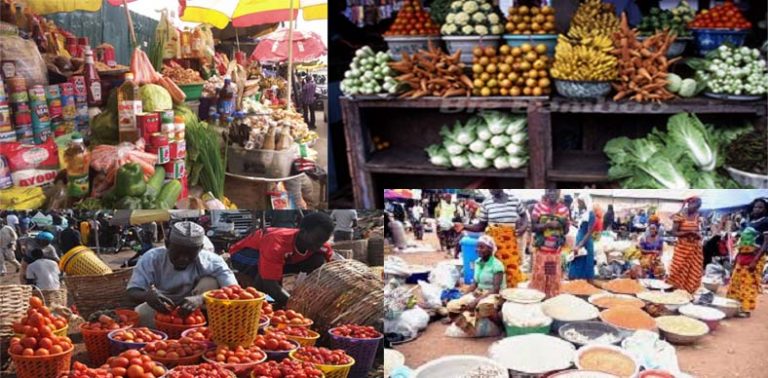Amid the free fall of the naira to the United States dollar, traders who deal in grains have devised a way to sell their wares to neighbouring countries for higher profits.
Many of them, who spoke to our correspondents, claimed that they preferred to sell their wares to the countries because they had stronger currencies compared to the naira.
This, several experts have said, may lead to hoarding and an artificial grain scarcity and can cause the price of the goods to further head north, thereby leading to a food crisis if nothing is done about it.
This is coming at a time when the country is battling severe hunger, as the prices of staples have increased by over 300 per cent.
The country is also witnessing the highest inflation in 28 years, with the food inflation rate in January hitting 35.41 per cent.
Nigeria’s annual inflation rate rose to 29.90 per cent in the same month from 28.92 per cent in December 2023, according to official figures from the National Bureau of Statistics.
For instance, a bag of long grain rice now sells for almost N80,000 as against N45,000, which it sold for in December 2023. A crate of eggs now sells for almost N5,000; in December, it sold for N2,700.
Several other food items have also seen an astronomical increase in prices owing to several market forces, chief of which is the free fall of the naira.
As of Thursday, the naira fell to a new record low, selling for 1,851 to a dollar in intra-day trading compared with around 1,800 quoted in street trading, FMDQ Exchange data showed on Friday.
It, however, recovered later in the day to close around N1,571 to the dollar, according to the FMDQ data.
There have also been cases of traders accused of hoarding food items for transfer to neighbouring countries like Cameroon, Chad, and Niger Republic, among others.
This is not unconnected to the fact that the currency used by these West African countries has strengthened against the naira in recent years.
For instance, in Borno, Niger, Adamawa, Katsina, Sokoto and several other northern states, grain farmers and traders told Sunday PUNCH that they preferred to sell their goods in the neighbouring countries and earn CFA franc instead of selling in Nigeria and earning naira.
Several sources also told Sunday PUNCH that the draining of Nigeria’s grains to neighbouring Niger had almost tripled over the last couple of months in a trans-border trade upheaval.
This is following the historic depreciation of the naira and the consequent exponential appreciation of the CFA franc.
The upheaval has drastically crashed the flow of Nigerian grains and other essential commodities’ merchants to the Francophone country for trade.
CFA franc
The CFA franc stands for the West African CFA franc and the Central African CFA franc, two currencies which though different, are interchangeable and have a fixed exchange rate to the euro.
The Central African CFA is the official currency of six countries under the Central African Economic and Monetary Union and is symbolised by the abbreviation XAF in currency markets.
The countries are Cameroon, Central African Republic, Chad, Republic of the Congo, Equatorial Guinea, and Gabon.
On the other hand, the West African CFA franc is the official currency of eight member nations under the West African Economic and Monetary Union consisting of Benin, Burkina Faso, Côte D’Ivoire, Guinea-Bissau, Mali, Niger, Senegal, and Togo.
It is symbolised by the abbreviation XOF in currency markets.
According to a short history on the website of the Central Bank of West African States, the CFA franc was created on December 26, 1945, remarkably the date France ratified the Bretton Woods Agreements and made its first declaration of parity to the International Monetary Fund.
In recent times, the currency has climbed up in value against the naira as N1 exchanges for 1.38 XOF compared to 3 XOF, which it exchanged for in 2015.
In 2015, data available on the website of Exchange Rate United Kingdom shows a 54 per cent decline in the exchange between naira and XAF and XOF within six years.
That same year, the CFA began to take a spot as a competitive currency. Between August 2015 and August 2016, the naira lost about 69 per cent against the CFA year-on-year, according to official data by the Exchange Rate UK.
As of Saturday, Aboki FX Limited, an online platform that provides daily updates and information on the parallel market (black market), noted that 1,000 West African CFA francs (XOF) traded at N2,400.
This means one can get N2,400 for every 1,000 CFA franc that one exchanges.
There is no rule that says you cannot take things from Nigeria to Europe by exporting. It’s not that there is no food, it’s just that it is not affordable.
“Anybody who smuggles anything should be punished according to the law. But if they are taking it out legitimately, there is nothing wrong with that because we also encourage people to export what they produce.”
He further advised the government to invest more in agriculture because of the drop in productivity.
Economist caution govt
Reacting to the development, a professor of Economics, Adebayo Abayomi, said rice merchants taking their produce to neighbouring countries because of the rise in the exchange value of CFA franc to naira were private economic agents rationally reacting to their selfish interest as dictated by the realities of the current economy.
He added that it was a normal business phenomenon as entrepreneurs do business to maximise their profits, noting that their actions indicated their efforts towards getting the best value in the current economy.
Abayomi also appealed to the Federal Government to stabilise the value of the naira.



